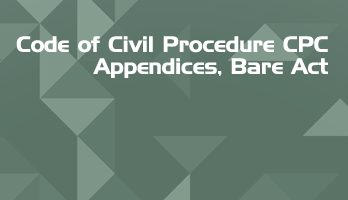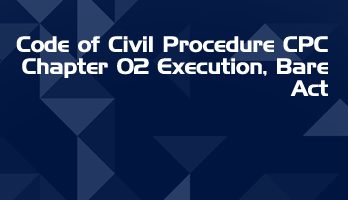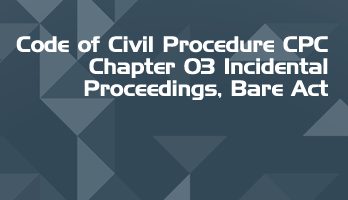A 'Bare act' is the actual legislation passed by the Parliament of India. Generally, an act sets out the high level legal and policy principles applicable to the subject matter of the law.
Most acts are accompanied by 'subsidiary legislation' such as rules, regulations, notifications and orders; which address the actual implementation detail of the act.
Free Full Course Available on LawMint's YouTube Channel
How to Land Your Dream LLB Internship in a Top Law Firm
- Part 1 - Introduction
- Part 2 - Internship Planning
- Part 3 - Internship Research
- Part 4 - Building Your Profile
- Part 5 - The Email
- Part 6 - The Resume
- Part 7 - The Cover Letter
- Part 8 - The Interview
- Part 9 - Self Development
Practical and comprehensive course, with real examples and step-by-step analysis of the complete internship application process. Check out LawMint's YouTube channel now!
Civil Procedure Code, 1908
Part IV – Suits in Particular Cases
Section 79 – Suits by or against Government
In a suit by or against the Government, the authority to be named as plaintiff or defendant, as the case may be, shall be –
- in the case of a suit by or against the Central Government, the Union of India, and
- in the case of a suit by or against a State Government, the State.
Section 80 – Notice
- Save as otherwise provided in sub – section (2), no suits shall be instituted against the Government (including the Government of the State of Jammu & Kashmir) or against a public officer in respect of any act purporting to be done by such officer in his official capacity, until the expiration of two months next after notice in writing has been delivered to, or left at the office of –
- in the case of a suit against the Central Government, except where it relates to a railway, a Secretary to that Government;
- in the case of a suit against the Central Government where it relates to railway, the General Manager of that railway; bb. in the case of a suit against the Government of the State of Jammu and Kashmir the Chief Secretary to that Government or any other officer authorised by that Government in this behalf;
- in the case of a suit against any other State Government, a Secretary to that Government or the Collector of the district; and, in the case of a public officer, delivered to him or left at this office, stating the cause of action, the name, description and place of residence of the plaintiff and the relief which he claims; and the plaint shall contain a statement that such notice has been so delivered or left.
- A suit to obtain an urgent or immediate relief against the Government (including the Government of the State of Jammu & Kashmir) or any public officer in respect of any act purporting to be done by such public officer in his official capacity, may be instituted, with the leave of the Court, without serving any notice as required by sub – section (1); but the Court shall not grant relief in the suit, whether interim or otherwise, except after giving to the Government or public officer, as the case may be, a reasonable opportunity of showing cause in respect of the relief prayed for in the suit; Provided that the Court shall, if it is satisfied, after hearing the parties, that no urgent or immediate relief need be granted in the suit, return the plaint for presentation to it after complying with the requirements of sub – section (1).
- No suit instituted against the Government or against a public officer in respect of any act purporting to be done by such public officer in his official capacity shall be dismissed merely by reason of any error or defect in the notice referred to in sub – section (1), if in such notice –
- the name, description and the residence of the plaintiff had been so given as to enable the appropriate authority or the public officer to identify the person serving the notice and such notice had been delivered or left at the office of the appropriate authority specified in sub – section (1), and
- the cause of action and the relief claimed by the plaintiff had been substantially indicated.
STATE AMENDMENTS
Madhya Pradesh – (i) After sub – section (3) of Section 80 the following inserted: “(4) where in a suit or proceeding referred to in Rule 3B of Order 1, the state is joined as a defendant or non – applicant or where the Court orders joinder of the State as defendant or non – applicant in exercise of powers under Rule 10(2) of order 1 such suit or proceeding shall not be dismissed by reasons of Omission of the plaintiff or applicant to issue notice under sub – section (1)”. (ii) In sub – section (1) of section 80 for the words “sub – section (2)” substitute “sub – section (2) or (4)”.
Section 81 – Exemption from arrest and personal appearance
In a suit instituted against a public officer in respect of any act purporting to be done by him in his official capacity –
- the defendant shall not be liable to arrest nor his property to attachment otherwise than in execution of a decree, and
- where the Court is satisfied that the defendant cannot absent himself from his duty without detriment to the public service, it shall exempt him from appearing in person.
Section 82 – Execution of decree
- Where, in a suit by or against the Government or by or against a public officer in respect of any act purporting to be done him in his official capacity, a decree is passed against the Union of India or a State or, as the case may be, the public officer, such decree shall not be executed except in accordance with the provisions of sub – section (2).
- Execution shall not be issued on any such decree unless it remains unsatisfied for the period of three months computed from the date of such decree.
- The provisions of sub – sections (1) and (2) shall apply in relation to an order or award as they apply in relation to a decree, if the order or award –
- is passed or made against the Union of India or a State or a public officer in respect of any such act as aforesaid, whether by a Court or by any other authority; and
- is capable of being executed under the provisions of this code or of any other law for the time being in force as if it were a decree.
Section 83 – When aliens may sue
Alien enemies residing in India with the permission of the Central Government, and alien friends, may sue in any Court otherwise competent to try the suit, as if they were citizens of India, but alien enemies residing in India without such permission, or residing in a foreign country, shall not sue in any such court.
Explanation – Every person residing in a foreign country, the Government of which is at war with India and carrying on business in that country without a licence in that behalf granted by the Central Government, shall, for the purpose of this section, be deemed to be an alien enemy residing in a foreign country.
Section 84 – When foreign State may sue
A foreign State may sue in any competent Court;
Provided that the object of the suit is to enforce a private right vested in the Ruler of such State or in any officer of such State in his public capacity.
Section 85 – Persons specially appointed by Government to prosecute or defend on behalf of foreign Rulers
- The Central Government may, at the request of the Ruler of a foreign State or at the request of any person competent in the opinion of the Central Government to act on behalf of such Ruler, by order, appoint any persons to prosecute or defend any suit on behalf of such Ruler, and any persons so appointed shall be deemed to be the recognized agents by whom appearances, acts and applications under this Code may be made or done on behalf of such Ruler.
- An appointment under this section may be made for the purpose of a specified suit or of several specified suits, or for the purpose of all such suits as it may from time to time be necessary to prosecute or defend on behalf of such Ruler.
- A person appointed under this section may authorise or appoint any other persons to make appearances and applications and do acts in any such suit or suits as if he were himself a party thereto.
Section 86 – Suits against foreign Rulers, Ambassadors and Envoys
- No foreign State may be sued in any Court otherwise competent to try the suit except with consent of the Central Government certified in writing by a Secretary to that Government; Provided that a person may, as a tenant of immovable property, sue without such consent as aforesaid a foreign State from whom he holds or claims to hold the property.
- Such consent may be given with respect to a specified suit or to several specified suits or with respect to all suits of any specified class or classes, and may specify, in the case of any suit or class of suits, the Court in which the foreign State may be sued, but it shall to be given, unless it appears to the Central Government that the foreign State –
- has instituted a suit in the Court against the person desiring to sue it, or
- itself or another, trades within the local limits of the jurisdiction of the Court, or
- is in possession of immovable property situate within those limits and is to be sued with reference to such property or for money charged thereon, or
- has expressly or impliedly waived the privilege accorded to it by this section.
- Except with the consent of the Central Government, certified in writing by a Secretary to that government, no decree shall be executed against the property of any foreign State.
- The proceeding provisions of this section shall apply in relation to –
- any Ruler of a foreign State; aa. any ambassador or Envoy of a foreign State;
- any High Commissioner of a Commonwealth country; and
- any such member of the staff of the foreign State or the staff or retinue of the Ambassador or Envoy of a foreign State or of the High Commissioner of a Commonwealth country as the Central Government may, by general or special order, specify in this behalf.
- the following persons shall not be arrested under this Code, namely –
- any ruler of a foreign State;
- any Ambassador or Envoy of a foreign State;
- any High Commissioner of a Commonwealth country;
- any such member of the staff of the foreign State or the staff or retinue of the Ruler, Ambassador or Envoy of a foreign State or of the High Commissioner of a Commonwealth country, as the Central Government may, by general or special order, specify in this behalf.
- Where a request is made to the Central Government for the grant of any consent referred to in sub – section (1), the Central Government shall, before refusing to accede to the request in whole or in part, give to the person making the request a reasonable opportunity of being heard.
Section 87 – Style of foreign Rulers as parties to suits
The Ruler of a foreign State may sue, and shall be sued, in the name of his State;
Provided that in giving the consent referred to in section 86, the Central Government may direct that the Ruler may be sued in the name of an agent or in any other name.
Section 87A – Definitions of “foreign State” and “Ruler
- In this Part –
- “foreign State” means any State outside India which has been recognised by the Central Government; and
- “Ruler”, in relation to a foreign State, means the person who is for the time being recognized by the Central Government to be the head of that State.
- Every Court shall take judicial notice of the fact –
- that a state has or has not been recognized by the Central Government;
- that a person has or has not been recognized by the Central Government to be the head of a State.
Section 87B – Applications of sections 85 and 86 to Rulers of former Indian States
- In the case of any suit by or against the Ruler of any former Indian State which is based wholly or in part upon a cause of action which arose before the commencement of the Constitution or any proceedings arising out of such suit, the provisions of section 85 and sub – sections (1) and (3) of section 86 shall apply in relation to such Ruler as they apply in relation to the Ruler of a foreign State.
- In this section –
- “former Indian State” means any such Indian State as the Central Government may, by notification in the Official Gazette, specify for the purposes of this;
- “commencement of the Constitution” means the 26th day of January, 1950; and
- “Ruler” in relation to a former Indian State, has the same meaning as in article 363 of the Constitution.
Section 88 – Where interpleader suit may be reinstituted
Where two or more persons claim adversely to one another the same debts, sum of money or other property, movable or immovable, from another person, who claims no interest therein other than for charges or costs and who is ready to pay or deliver it to the rightful claimant such other person may institute a suit of interpleader against all the claimants for the purpose of obtaining a decision as to the person to whom the payment or delivery shall be made and of obtaining indemnity for himself;
Provided that where any suit is pending in which the rights of all parties can properly be decided, no such suit of interpleader shall be instituted.
Important Central Acts in Regional Languages
Legislative department website also features regional language versions of several important Central Acts.
Free Full Course Available on LawMint's YouTube Channel
How to Land Your Dream LLB Internship in a Top Law Firm
- Part 1 - Introduction
- Part 2 - Internship Planning
- Part 3 - Internship Research
- Part 4 - Building Your Profile
- Part 5 - The Email
- Part 6 - The Resume
- Part 7 - The Cover Letter
- Part 8 - The Interview
- Part 9 - Self Development
Practical and comprehensive course, with real examples and step-by-step analysis of the complete internship application process. Check out LawMint's YouTube channel now!












